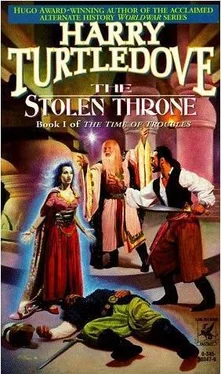Busts of the Four Prophets adorned the armlet: young Narseh, his beard barely sprouted; Gimillu the warrior, a strong face seamed with scars; Shivini, who looked like everyone's mother; and Fraortish, eldest of all, his eyes inset with gleaming jet. Though the silver band had just come from Tanshar's arm, it was cool, almost cold, to the touch.
The fortune-teller looked up at the thatched roof of his little cottage. Abivard's gaze followed Tanshar's. All he saw was straw, but he got the odd impression that Tanshar peered straight through the roof and up to the God's home on the far side of the sky.
"Let me see," Tanshar murmured. "May it please you, let me see." His eyes went wide and staring, his body stiffened. Abivard's left hand, the one that held the armlet, tingled as if it had suddenly fallen asleep. He looked down. A little golden light jumped back and forth from one Prophet's image to the next. At last it settled on Fraortish, eldest of all, making his unblinking jet eyes seem for an instant alive as they stared back at Abivard.
In a rich, powerful voice nothing like his own, Tanshar said, "Son of the dihqan, I see a broad field that is not a field, a tower on a hill where honor shall be won and lost, and a silver shield shining across a narrow sea."
The light in the silver Fraortish's eyes faded. Tanshar slumped as he seemed to come back to himself. When Abivard judged the fortune-teller had fully returned to the world of rickety wicker chairs and the astounding range of smells from the bazaar, he asked, "What did that mean, what you just told me?"
Maybe Tanshar wasn't all the way back to the real world: his good eye looked as blank as the one that cataract clouded. "I have delivered the prophecy?" he asked, his voice small and uncertain.
"Yes, yes," Abivard said impatiently, repeating himself like his father. He gave Tanshar back the words he had uttered, doing his best to say them just as he had heard them.
The fortune-teller started to lean back in his chair, then thought better as it creaked and rustled under his weight. He took the armlet from Abivard and put it back on his parchment-skinned arm. That seemed to give him strength. Slowly he said, "Son of the dihqan, I remember nothing of this, nor did I speak to you. Someone-something-used me as an instrument." Despite the bake-oven heat, he shivered. "You will see I am no youth. In all my years of telling what might lay ahead, this has befallen me but twice before."
The little hairs prickled up on Abivard's arms and at the back of his neck. He felt caught up in something vastly bigger than he was. Cautiously he asked, "What happened those two times?"
"One was a skinny caravaneer, back around the time you were born," Tanshar said. "He was skinny because he was hungry. He told me I foresaw for him piles of silver and gems, and today he is rich in Mashiz."
"And the other?" Abivard asked.
For a moment, he didn't think Tanshar would answer. The fortune-teller's expression was directed inward, and he looked old, old. Then he said, "Once I was a lad myself, you know, a lad with a bride about to bear him his firstborn. She, too, asked me to look ahead."
So far as Abivard knew, Tanshar had always lived alone. "What did you see?" he asked, almost whispering.
"Nothing," Tanshar said. "I saw nothing." Again Abivard wondered if he would go on. At last he did: "She died in childbed four days later."
"The God give her peace." The words tasted empty in Abivard's mouth. He set a hand on Tanshar's bony knee. "Once for great good, once for great ill. And now me. What does your foretelling mean?"
"Son of the dihqan, I do not know," Tanshar answered. "I can say only that these things lie across your future. When and where and to what effect, I cannot guess and shall not lie to claim I can. You will discover them, or they you, as the God chooses to unwind the substance of the world."
Abivard took out three silver arkets and pressed them into the fortune-teller's hand. Tanshar rang them against one another, then shook his head and gave them back. "Offer these to the God, if that please you, but not to me. I did not speak these words, whether they came through me or not. I cannot accept your coin for them."
"Keep them, please," Abivard said, looking around the clean but barren little house. "To my mind, you stand more in need of them than the God."
But Tanshar again shook his head and refused to take the money. "They are not for me, I tell you. Had I read your future in the ordinary way, gauging what was to come by the motions of the Prophets' armlet between your hand and mine, I should be glad of the fee, for then I had earned it. For this-no."
One of the things Godarz had taught Abivard was to recognize a man's stubbornness and to know when to yield to it. "Let it be as you say, then." Abivard flung the arkets out the window. "Where they go now, and with whom, is in the God's hands."
Tanshar nodded. "That was well done. May the foretelling you heard through me mean only good for you."
"May it be so," Abivard said. When he rose from the chair, he bowed low to Tanshar, as he might have to one of the upper nobility. That seemed to distress the fortune-teller even more than the prophecy that had escaped its usual bounds. "Accept the salute, at least, for the God," Abivard told him, and, reluctantly, he did.
Abivard left the fortune-teller's house. He had thought to linger in the bazaar awhile longer, buying more small things he didn't really need so he could look at, maybe even talk with, the young women there. Not now, though.
He peered out over the sun-scorched land that ran out toward the Vek Rud River. Nothing much grew on it now, not at this season. Did that make it a broad field that was not a field? Prophecy had one problem: how to interpret it.
He turned and looked up the slope of the hill on which the stronghold perched. Was it the tower where honor would be won and lost? It didn't look like a tower to him, but who could judge how the God perceived things?
And what of the sea? Did Tanshar's words mean he would see it one day, as he hoped? Which sea had the fortune-teller meant? Who would shine a silver shield across it?
All questions-no answers. He wondered if he would have been happier with an ordinary foretelling. No, he decided. If nothing else, this surely meant he would be bound up in great events. "I don't want to watch my life slide by while I do nothing but count the days," he said aloud.
For all his father's teaching, he was still young.
* * *
In the days and weeks that followed, Abivard took to looking south and west from the walls. He knew what he was waiting to see. So did Godarz, who teased him about it every so often. But the dihqan spent a good deal of time at the corner where the eastern and the south-facing walls met, too.
Abivard felt justified in haunting that corner when he spied the rider approaching the stronghold. The horseman carried something out of the ordinary in his right hand. At first, Abivard saw only the wriggling motion. Then he recognized that a banner was making it. And then he saw the banner was red.
He let out a whoop that made heads turn his way all around the stronghold.
"The war banner!" he cried. "The war banner comes forth from Mashiz!"
He didn't know where Godarz had been, but his father stood on the wall beside him in less than a minute. The dihqan also peered south. "Aye, that is the war banner, and no mistake," he said. "Let's go down and greet the messenger, shall we? Let's go."
The horseman who carried the token of war was worn and dusty. Godarz greeted him with all the proper courtesies, pressing wine and honey cakes on him before inquiring of his business. That question, though, was but a formality.
The crimson banner, limp now that the messenger no longer rode at a fast trot, spoke for itself.
Читать дальше












